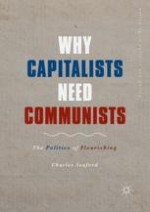2019 | OriginalPaper | Buchkapitel
4. Change in the Past (1)
verfasst von : Charles Seaford
Erschienen in: Why Capitalists Need Communists
Aktivieren Sie unsere intelligente Suche, um passende Fachinhalte oder Patente zu finden.
Wählen Sie Textabschnitte aus um mit Künstlicher Intelligenz passenden Patente zu finden. powered by
Markieren Sie Textabschnitte, um KI-gestützt weitere passende Inhalte zu finden. powered by
